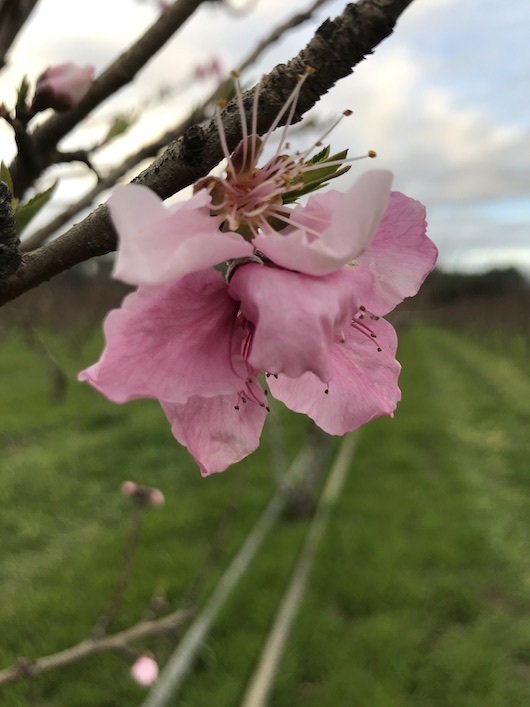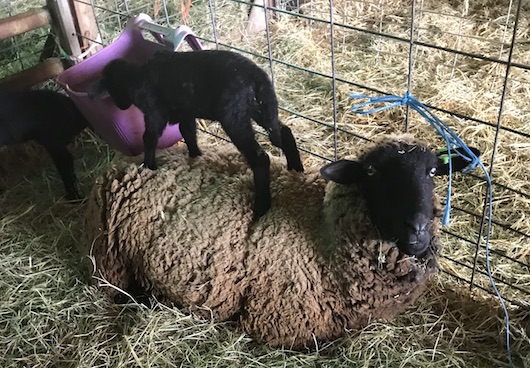
The first day of Spring is officially not until March 20, but there’s a feeling in the air that Spring is right around the corner. In a worrisome note, this has been one of the driest winters we’ve seen.
It’s Community Supported Agriculture Week!
Technically, it’s CSA Week at Full Belly Farm for all but four weeks of the year, but this is the week that many farms and farm support organizations across the country will be promoting CSAs and encouraging people to join. For CSAs that don’t operate year-round, this time of year is a popular time to sign up new members in advance of starting in the spring. We’re in a different situation – we do our CSA year-round and we bring on new members on a rolling basis (instead of requiring members to join for a whole year/season). We also currently are doing just fine on membership and have a waiting list for the first time since starting the CSA in 1992, but we still think CSAs are worth celebrating and talking about.
First, let’s go back to the basics. Community Supported Agriculture (CSA) is a farm membership system that allows consumers to sign up to receive a farm’s products (veggies, eggs, meat, etc). For most farms, they sign up to receive products every week for a season. As previously mentioned, ours offers a bit more flexibility. Along with getting to enjoy fresh, delicious, and local food, being a CSA member is an excellent way to support and get to know your local farmers.
The history of CSAs doesn’t have one clear first, but the record shows they emerged in Europe and Japan in the 1960s and while it’s often said that CSAs started in the US in 1986 at Indian Line Farm in Massachusetts and Temple-Wilton Community Farm in New Hampshire, this narrative overlooks the contributions of Booker T. Whatley. He was a Black author, horticulturist, and professor at Tuskegee University who identified 10 commandments he considered essential for successful farming in the 1960s. Included in these commandments was the concept of a “Clientele Membership Club,” in which members paid a fee upfront to pick their own produce during the growing season. Since those early CSAs and membership clubs, many farms have adopted the model and adapted it to meet their needs. In some cases, communities interested in produce hired farmers, instead of the farmers finding members.
Why do farms and members still do CSAs? Some of the benefits:
- Consumers get food that’s fresher than stores, there is more transparency about their food, and they gain a connection to their food and the people that grow it.
- Farmers have more stability when deciding what (and how much) to produce and face less risk from low commodity prices and crop loss. Farmers receive better prices for their crops, gain some financial security, and are relieved of some of the burden of marketing.
- Everyone benefits from food dollars staying in the local economy, shorter supply chains, from farms that can focus on long term ecological investments, and the community bonds that develop between farm and consumer.
CSAs aren’t the right answer for every farm or potential CSA member. In terms of the farm: CSAs require a fair amount of time to find members, communicate with them, and lots of crop planning and management. In terms of potential members: They may want more control over the varieties and quantities of produce that they get, pick-up sites may not be convenient, and more.
Above all else, CSAs provide a way for consumers to connect with fresh local food while helping to make local food systems and communities more resilient. But the same could be said for farmers markets and many local stores. What makes CSAs different is the explicit mutual trust agreement between us (the farm) and you (the consumer). You may not have realized it when you signed up, but you weren’t just giving us money to get produce, you were entering into a relationship of mutual trust in which you were giving us your financial support with the hope and expectation that we would provide you with produce in the future. You agreed to share the risks and the bounty of farming with us. You were investing in the farm with the expectations of dividends in the future, in the form of the produce in your box. Just like when you invest in the stock market, giving those companies your financial support, things can happen – crops can fail or can do really well. You can withdraw your investment if it isn’t working for you (in California, CSAs typically lose 37% of their members annually) but if you stick with the farm, your investment should pay off over time. We, and other farms, value our CSA members because, in addition to building great relationships and getting to know you, you provide a dependable revenue stream for us and we know that a chunk of our produce has a home and has been spoken for, meaning it won’t go to waste. We don’t have that guarantee when we go to farmers markets and plant seeds hoping that stores and restaurants will buy our produce.
We all make a lot of decisions about what food we eat – not just what the food is and how we prepare it but where it’s from, how it was treated, how the people who grow and prepare it are treated, and the impact on the local and international ecosystem. Just looking at produce, not prepared foods, we have so many choices. We appreciate you trusting us to supply you with fresh, delicious, and local food and we value the community we have gained through our CSA.
Happy CSA week – encourage your friends and family around the country (they definitely are not just a California thing!) to learn more about CSAs and see if it’s right for them.
Elaine Swiedler
CSA Manager

Thanks Mom! This baby is getting a big leg up from Mom in the world. We’re almost done with lambing for this season. The green tinge is a reflection from the green tarp overhead in the barn.
